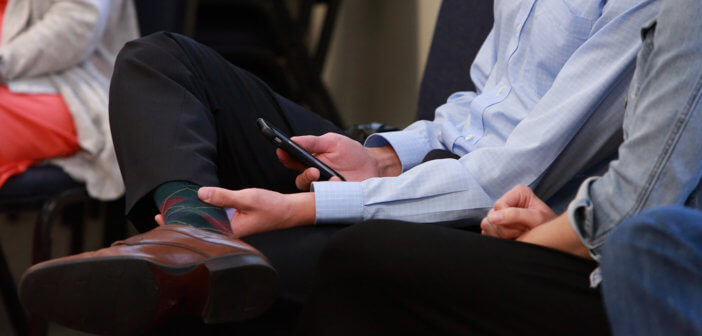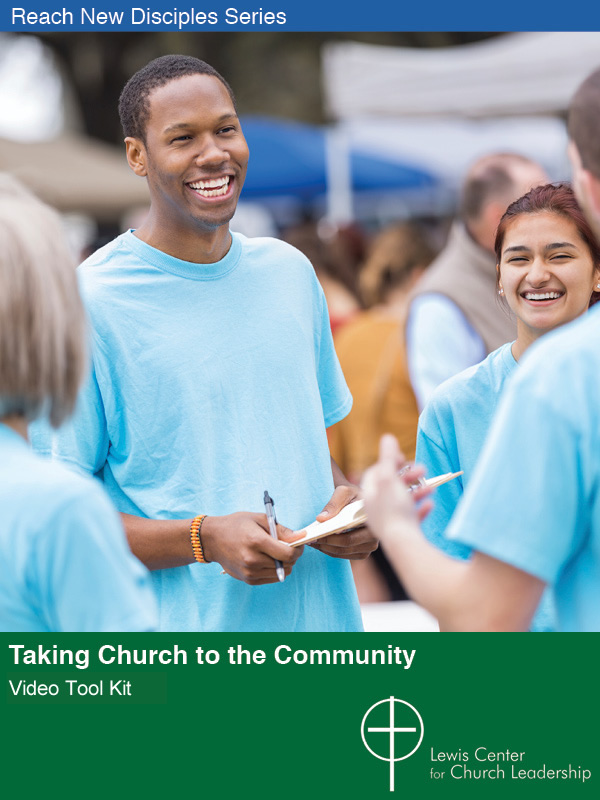Olu Brown says telling people to turn off their cellphones in worship sounds crazy to technologically progressive people who rely on their devices for just about everything. Instead, they should be invited to use them to engage worship more deeply.
En español — Deje de decirle a la gente que apague su celular en la iglesia
It always strikes me as funny when a church leader announces to a congregation that the sanctuary is a place where all smartphones must be turned off. That would work 10 years ago, but not now, when smartphone use is off the charts and is the way many people connect to the world. When we admonish people for using their smartphones, we are displaying an old, outdated philosophy of technology.
So often, I see young adults and older adults in public spaces interacting more with their smartphones than with the people around them. As much as we as say that people should be more intentional about verbal and social interactions, studies and quick scans of public places, like restaurants and malls, clearly show that asking people to disconnect from their smartphones is unlikely in our present-day culture.
The reason I laugh whenever I hear church leaders telling people to discontinue use of their smartphone in church is because they are really saying, “Disconnect yourself from the entire world and resources to help you connect with God as we step back into the 13th century and bore you to death for a couple of hours.” Sound crazy? It is, and this is what people who live in a technologically progressive world hear when they enter many churches for worship. I don’t think we should ask people to choose between their technology or God. Rather, they should be invited to experience God through many of the devices they use on a daily basis, whether to review scripture or fact-check the preacher on Google. Yes! Believe it or not, people are actually fact-checking you on Google as you preach.
Technology is an important factor for local congregations as they face and embrace change. Those that lean in, intentionally developing a forward-looking philosophy of technology, will be the vital and healthy churches of the 21st century.
Whether we like it or not, technology is here to say, and it can be one of the best ways to examine where we are socially and culturally as organizations and churches. When I think about the church of the 21st century, I think about churches that aren’t second or third generation adapters in the technology space but are leading the way and ensuring they support at every level the latest technology trends and developments. This doesn’t mean churches need to become the next Google or Apple, but it does mean they don’t need to fight the efforts of technology innovation. Instead, they must find as many ways as possible to embrace technology in our church programs, administration, systems, and worship.
Trying to compete against the use and presence of technology in our local churches would be similar to a church leader attempting to stop the innovation of the Gutenberg press of the 15th century that helped open the way for literature and Bibles to be shared with the masses as opposed to the few. Some might say that the revolution of the smartphone and other forms of technology from video, graphics, internet, and audio are modern-day Gutenberg press innovations that cannot be barricaded by a guardrail but must be released so information can flow to the masses.
This article is excerpted from 4D Impact: Smash Barriers Like a Smart Church (Abingdon Press, 2019) by Olu Brown. Used by permission. The book is available at Cokesbury and Amazon.
Related Resources
- 5 Keys to Great Online Worship Hospitality by Olu Brown
- The Theology of Social Media by Thomas G. James
- Should you Take an Electronic Sabbath? by Thomas G. James







